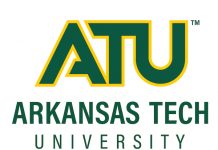Dr. Sean Huss and Dr. James Stobaugh, members of the Arkansas Tech University Department of Behavioral Sciences faculty, testified before the Arkansas Legislative Council higher education subcommittee concerning the issue of food insecurity at university campuses on Monday, June 18.
Huss and Stobaugh are advisors for Because We Can, a registered student organization at ATU that operates a food recovery program that provides meals for approximately 1,200 local citizens in need per month and a food pantry that provides for the nourishment needs of those facing food insecurity within the university community.
Rep. Greg Leding of Fayetteville, co-chair of the subcommittee, said that Huss and Stobaugh highlighted the importance of public-private partnerships in fighting hunger on university campuses. The Green and Gold Cupboard, ATU’s internal food pantry, was started with a $67,760 grant from Tyson Foods.
Huss cited studies by the U.S. Centers for Disease Control and Prevention that have found that 10 percent of all clients at charitable food banks are college students and that as much as 25 percent of students on some campuses skip meals during the week because they lack financial resources.
“There is a common narrative that suggests being poor as a college student is a character building experience and a basic rite of passage for those that pursue a college education,” said Huss. “Many even suggest that if someone can afford to go to college, then they must have money and their poverty is temporary. These beliefs may be true of some college students, but increasingly we see that college students make decisions between buying a textbook or eating. The nature of college student poverty now is different and our cultural expectations haven’t kept up with what students truly face in terms of increases in tuition, textbooks and access to food.”
Huss also noted that adjunct faculty members and staff members account for approximately half of the food pantry users at larger universities around the United States.
Leding said he learned about the scope of food insecurity on university campuses when he visited the University of Arkansas at Fayetteville’s Full Circle Food Pantry in April. He said that testimony during the subcommittee meeting on Monday, June 18, indicated that the problem exists at other universities, as well.
“All of the campus food pantries that presented on Monday stressed that they are driven entirely by volunteers and donations,” said Leding. “While food and hygiene products are a priority, the staff person for the Trojan Marketplace at (the University of Arkansas at Little Rock) talked about how the pantry’s one computer no longer works, forcing the organization to keep paper records. If you live near a campus with a food pantry, reach out, find out what it needs the most and do what you can to help them get it.”
Huss has several suggestions for people who want to help combat food insecurity at Arkansas Tech.
“Take some ownership and get involved in both food recovery and the pantry,” said Huss. “Volunteer for a shift or two and see that commitment through. Make everyone aware that if they are hungry, they can get food at the pantry. Donate to our foundation account (on our webpage) and participate in food drives when we have them. Work to keep this issue at the forefront of our conversations. The pantry and the recovery program face an issue attention cycle always. People forget that there is a constant need in our community and on our campus, which is a problem for these programs.”





